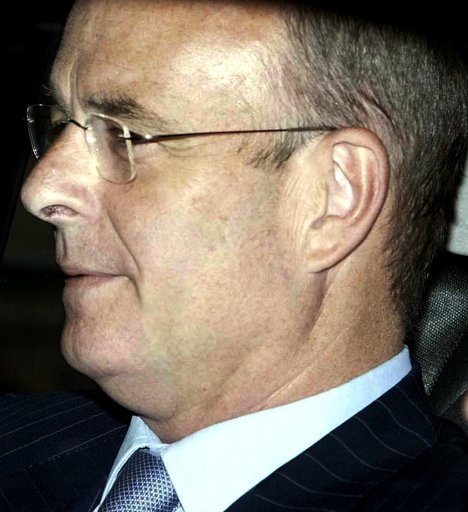John Scarlett, The MI6, Dodgy Dossiers, The Times And Statoi Oil In Iraq: How Power Works
 SIR John Mcleod Scarlett is on the board of Times Newspapers Ltd, part of News International. He’s held the post since January. Before that he was Director General of the British Secret Intelligence Service – MI6 – and chair of the Cabinet Office Joint Intelligence Committee.
SIR John Mcleod Scarlett is on the board of Times Newspapers Ltd, part of News International. He’s held the post since January. Before that he was Director General of the British Secret Intelligence Service – MI6 – and chair of the Cabinet Office Joint Intelligence Committee.
He drew up the dodgy dossier of September 2002. In 2009, the spy told the Iraq war inquiry that the dodgy dossier that suggested that Saddam Hussein’s Weapons of Mass Destruction could be unleashed within 45 minutes was produced with “no conscious intention” to mislead Westminster and the people:
“There was absolutely no conscious intention to manipulate the language or to obfuscate or to create a misunderstanding as to what this might refer to.”
The report had been “sexed-up” by Downing Street to get MPs to back the war in Iraq.
The report is thought to have led to the “suicide” of weapons adviser David Kelly.
Scarlett also has a job with Norwegian oil firm Statoi. So. Does he have any influence his current employers?
Well, Staoi are big in…Iraq.
And on the matter of how Britain cuddled up to Colonel Gaddafi, The Times’ editorial of September 6, notes:
Bringing Libya back within the community of nations, as Tony Blair did in 2004, was no mistake. This profound diplomatic shift, which was in no small part a triumph of British Intelligence, was the right move to make at the time. A world in which the Gaddafi Libyan Government was shorn of its weapons of mass destruction was a slightly less dangerous world as a result. There are times in diplomacy that consequences justify a choice of means that might preferably be avoided.
Yet they are rare. The man who is now the military commander in Tripoli, Abdel Hakim Belhadj, claims that he and his wife were taken back to Libya in 2004, where he was tortured, with the complicity of MI6 and the CIA. Parts of this claim seem, on the available evidence, to be confirmed by documents unearthed by Human Rights Watch from an abandoned building in Tripoli.
The MI6… Scarlett’s mob?
…The intelligence services did have grounds for believing that Libyans were involved in Islamist terrorist activities. Some co-operation with the regime was an imperative of national security.
Moreover, even if Mr Belhadj was interviewed by British and American intelligence after being tortured by Libyan authorities, it does not follow that foreign agents were made aware of the treatment that he had received. MI6 stressed yesterday that it seeks assurances that nobody be mistreated when they are handed over. Yet when the interlocutor is the notoriously brutal Gaddafi family, that assurance is, to put it generously, doubtful.
The doctrine of liberal interventionism is one to which this newspaper has lent strong support. It cannot be just to permit a tyrant to inflict slaughter on those insultingly described as his own people if the capacity exists to prevent it. By this year, Muammar Gaddafi was no longer a plausible partner for peace, and had begun an onslaught against civilians rebelling against his rule. The capacity did exist to see him restrained, and external intervention was justified.
Who is to blame?
The close relationship between Mr Koussa and Sir Mark Allen, MI6’s former director of counter-terrorism, exhibited in letters in which Sir Mark thanked Mr Koussa for the gift of some “delicious” dates, is obvious.
These may be the necessary niceties of realistic diplomacy. But these matters must be clarified. The doctrine of liberal interventionism is a high-minded one. It is brought into disrepute if it does not observe the highest standards and it needs to be shown beyond doubt that this has not happened.
No mention of Mr Scarlett.
Another Times article of February 27 talks on Saif Gaddafi’s dodfy thesis from the LSE. We were told:
The tyrant’s son and chief whitewasher
Among the key players involved in this deal were Saif Gadaffi and Sir Mark Allen, a senior MI6 officer who later worked for BP. Negotiations were conducted in the Travellers Club on Pall Mall.
No mention of Mr Scarlett is made.
On March 1, The Times reports again on the dodgy thesis:
In his thesis Mr Gaddafi acknowledges Professor Joseph Nye, an eminent economist at Harvard University, for reading portions of the manuscript and providing advice. He also credits Monitor Group, which employs Sir Mark Allen, a former MI6 agent and a senior adviser to BP, for providing the empirical data for his work. The Oxford University Press has put on hold plans to publish the thesis in book form.
No mention of Mr Scarlett is made.
On February 23, The Times reports:
But it should not be left to the Government alone to exert pressure on the Gaddafi regime. The people and institutions who have built relations with Libya should be pressing its leadership to depart. They include Sir Mark Allen, the former MI6 official, later of BP, who introduced BP’s chief executive to the Libyan regime.
No mention of Mr Scarlett is made.
Such are the facts…
Posted: 15th, September 2011 | In: Key Posts, Politicians 0 Comments | TrackBack | Permalink


